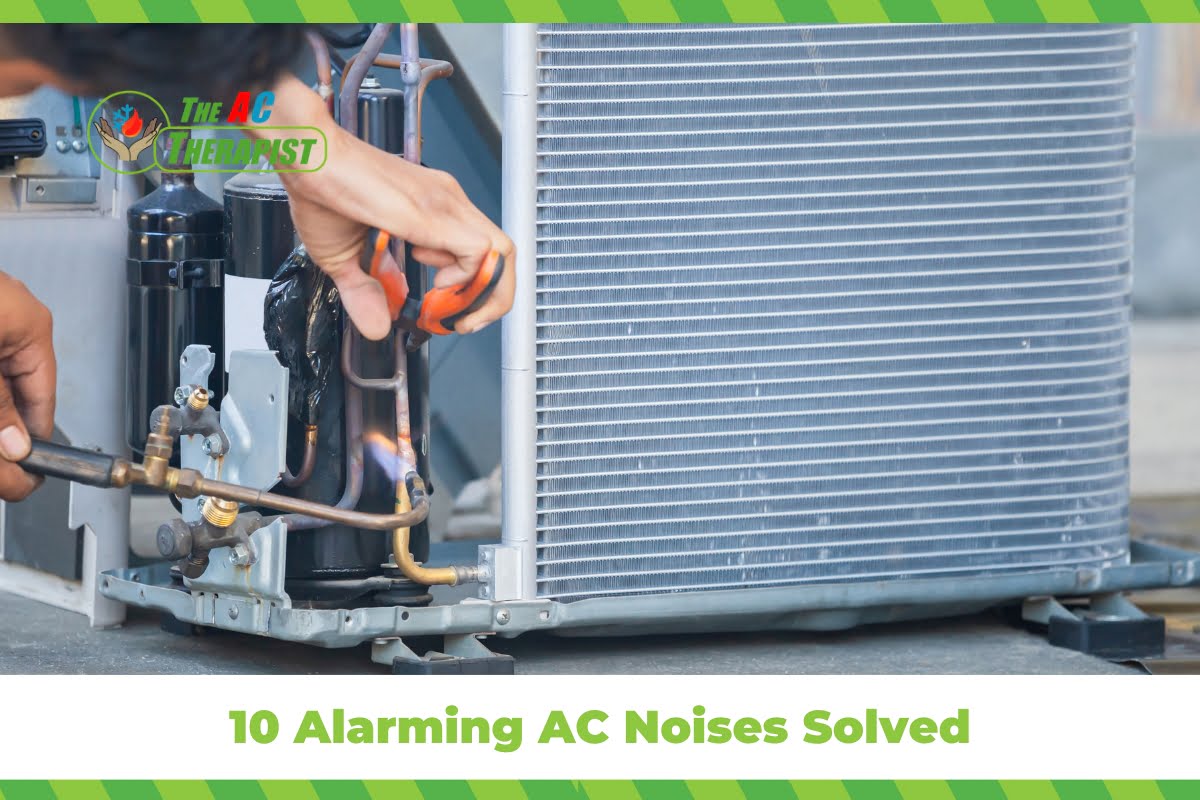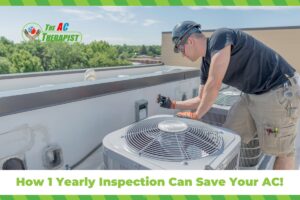10 Alarming AC Noises Solved
Air conditioners play an essential role in maintaining a comfortable environment in our homes, especially during the hot summer months. However, one of the most unsettling experiences for a homeowner can be the sudden emergence of unfamiliar AC noise. These noises can vary widely, from common and relatively benign sounds to strange and alarming noises that may indicate significant issues. Recognizing and understanding the different types of AC noise is crucial for diagnosing problems early, maintaining your unit’s efficiency, and ensuring its longevity.
In this detailed guide, we will delve into the world of AC noise, helping you to identify and interpret the various sounds your air conditioner might produce. By becoming familiar with these noises, you can take proactive steps to address potential issues before they escalate into costly repairs or system failures. Whether it’s a persistent buzzing, an unexpected clicking, or a concerning banging AC noise, knowing what to listen for can make all the difference.
We will cover the most common AC noises you are likely to encounter, explaining what they typically signify and how you can resolve them. Additionally, we will highlight the more unusual and alarming AC noises that require immediate attention from a professional. By the end of this guide, you will be well-equipped to handle any AC noise you encounter, ensuring your air conditioning system remains in top-notch condition.
Understanding AC noise is not just about addressing immediate concerns; it’s about being an informed homeowner who can effectively manage and maintain their HVAC system. So, let’s embark on this journey to decode the various AC noises, enhance your knowledge, and keep your cooling system running smoothly and quietly.
Strange or Alarming AC Noises
1. Banging and Clanging Noises
Causes:
Banging or clanging sounds typically indicate a problem with the AC unit’s internal components. These noises are often caused by:
- Loose or broken parts inside the compressor
- An unbalanced fan or blower
- A misaligned or loose belt
- Debris inside the unit
Fixes:
- Turn off the power: Always ensure the AC unit is turned off before attempting any repairs.
- Inspect the compressor: Check for loose or broken parts. Tighten any loose components and replace broken parts if necessary.
- Balance the fan: Ensure the fan blades are not bent and are balanced. If the blades are damaged, replace them.
- Check the belt: If the noise is coming from the belt, check its alignment and tension. Replace the belt if it is worn out.
- Clean the unit: Remove any debris inside the unit. Regular cleaning can prevent many common issues.
2. Buzzing Sounds
Causes:
Buzzing noises can stem from various sources, such as:
- Loose parts
- Debris in either the indoor or outdoor unit
- Dirty condenser coils
- Failing motor
- Malfunctioning compressor
- Electrical issues, such as loose wiring or faulty capacitors
Fixes:
- Inspect for loose parts: Tighten any loose screws or bolts.
- Clean the coils: Dirty condenser coils can cause the unit to buzz. Clean them using a garden hose or a coil cleaner.
- Check the motor: Listen closely to determine if the motor is the source of the noise. If the motor is failing, it will need to be replaced.
- Examine the compressor: If the buzzing is coming from the compressor, it may be malfunctioning and require professional repair or replacement.
- Address electrical issues: Ensure all wiring is secure and inspect capacitors for signs of damage. Electrical issues should be handled by a qualified technician to avoid the risk of electric shock.
3. Clicking Sounds
Causes:
Clicking noises are often associated with electrical components. Common causes include:
- A defective thermostat
- Failing relay switch
- Loose or faulty wiring
- Debris stuck in the blower fan
Fixes:
- Check the thermostat: Ensure the thermostat is working correctly. Replace it if it is malfunctioning.
- Inspect the relay switch: If the relay switch is defective, it will need to be replaced.
- Secure the wiring: Look for loose or damaged wires and secure or replace them as necessary.
- Clean the blower fan: Remove any debris that may be obstructing the blower fan.

4. Hissing or Whistling Sounds
Causes:
Hissing or whistling sounds can indicate air leaks or pressure issues within the system. Possible causes include:
- Refrigerant leaks
- Leaky ducts
- High internal pressure
Fixes:
- Locate and fix refrigerant leaks: Refrigerant leaks should be addressed by a professional technician. If you suspect a leak, contact a certified HVAC technician to repair it and recharge the refrigerant.
- Inspect the ductwork: Look for gaps or cracks in the ducts and seal them using duct tape or a mastic sealant.
- Check system pressure: If the unit is experiencing high internal pressure, it may be due to a refrigerant overcharge or a blocked expansion valve. Both issues require professional attention.

5. Screeching or Squealing Sounds
Causes:
Screeching or squealing sounds usually come from the unit’s motor or fan. Common causes include:
- Worn-out fan belt
- Dry or worn bearings in the motor
- Malfunctioning fan motor
Fixes:
- Replace the fan belt: If the fan belt is worn out or misaligned, replace it with a new one.
- Lubricate the motor bearings: If the bearings are dry, lubricate them with a suitable motor oil. If they are worn out, the motor may need to be replaced.
- Check the fan motor: If the fan motor is malfunctioning, it may need to be repaired or replaced by a professional technician.
6. Rattling Noises
Causes:
Rattling noises can be caused by loose parts or debris inside the unit. Common causes include:
- Loose screws or bolts
- Loose or broken fan blades
- Debris in the condenser or evaporator coils
- Loose panels or covers
Fixes:
- Tighten loose parts: Inspect the unit for loose screws, bolts, or panels and tighten them.
- Check the fan blades: Ensure the fan blades are secure and not damaged. Replace any broken blades.
- Clean the coils: Remove any debris from the condenser or evaporator coils.
- Secure loose panels: Make sure all panels and covers are properly secured.
7. Humming Sounds
Causes:
Humming noises are often linked to electrical components or the compressor. Common causes include:
- Faulty capacitors
- Electrical issues
- Loose components
- Worn-out motor
Fixes:
- Inspect the capacitors: Look for signs of damage or wear on the capacitors. Replace them if necessary.
- Check electrical connections: Ensure all electrical connections are secure. If there are any signs of damage, contact a professional technician to repair them.
- Tighten loose parts: Secure any loose components that may be causing the humming noise.
- Examine the motor: If the motor is worn out, it may need to be replaced.
8. Thumping Sounds
Causes:
Thumping noises are often caused by issues with the blower or motor assembly. Common causes include:
- Unbalanced blower wheel
- Loose motor mounts
- Foreign objects in the blower housing
Fixes:
- Balance the blower wheel: Ensure the blower wheel is balanced and not damaged. Replace it if necessary.
- Secure the motor mounts: Tighten any loose motor mounts.
- Remove foreign objects: Inspect the blower housing for any foreign objects and remove them.
9. Gurgling Sounds
Causes:
Gurgling noises are usually associated with refrigerant flow or condensation issues. Common causes include:
- Low refrigerant levels
- Blocked condensate drain line
- Air in the refrigerant lines
Fixes:
- Check refrigerant levels: If the refrigerant level is low, contact a professional technician to recharge it.
- Clear the condensate drain line: Remove any blockages in the condensate drain line to ensure proper drainage.
- Purge air from refrigerant lines: If there is air in the refrigerant lines, a professional technician will need to purge the system.

10. Popping or Crackling Sounds
Causes:
Popping or crackling noises are often related to thermal expansion and contraction within the ductwork. Common causes include:
- Metal ducts expanding and contracting
- Loose duct connections
- Debris in the ducts
Fixes:
- Inspect duct connections: Ensure all duct connections are secure and tighten any loose ones.
- Add insulation: Adding insulation around the ducts can help reduce the noise caused by thermal expansion and contraction.
- Clean the ducts: Remove any debris from the ducts.
Common AC Noises
1. Humming
Causes:
- Normal operation of the motor and other components.
- Minor electrical issues or loose components.
Description: Humming is a low, consistent sound that is generally considered normal for an operating air conditioner. However, changes in the volume or pitch of the humming can indicate potential issues.
When to Worry: If the humming noise gets louder or is accompanied by other unusual sounds, it may indicate a more significant issue, such as a failing motor or electrical problems that need to be addressed.
2. Clicking
Causes:
- The sound of the thermostat sends signals to start or stop the AC.
- Relays and switches engaging.
Description: Clicking sounds are typically heard when the air conditioner starts up or shuts down. It’s the sound of electrical components and relays switching on or off.
When to Worry: Continuous or repetitive clicking can indicate a failing relay, a thermostat issue, or an electrical problem that needs attention from a professional.
3. Whooshing or Whistling
Causes:
- Air flowing through the vents.
- Minor air leaks in the ductwork.
Description: Whooshing or whistling sounds are usually the result of air moving through the HVAC system, particularly through vents and ducts.
When to Worry: If the whooshing or whistling becomes louder or more persistent, it may indicate a significant air leak or a problem with the airflow, which can lead to inefficient cooling.
4. Blowing or Rushing Air
Causes:
- Normal operation when the fan is running.
- Air moving through the ducts.
Description: Blowing or rushing air noises are common when the AC fan is operating and pushing air through the system. This sound is typically not a cause for concern.
When to Worry: If the sound changes in pitch or volume, it may indicate a problem with the blower motor or fan, which could require maintenance or repair.
5. Rattling
Causes:
- Loose screws or bolts.
- Loose or broken fan blades.
- Debris in the condenser or evaporator coils.
- Loose panels or covers.
Description: Rattling noises are common and often result from loose parts or debris inside the unit. It’s a mechanical sound that can vary in intensity.
When to Worry: Persistent rattling suggests loose components that could cause further damage if not secured. It’s essential to tighten any loose parts and remove debris to prevent long-term issues.
6. Hissing
Causes:
- Refrigerant leaks.
- Leaky ducts.
- High internal pressure.
Description: Hissing sounds can indicate air escaping from the system or refrigerant leaks. It’s a sharp, high-pitched noise that should not be ignored.
When to Worry: Hissing often points to refrigerant leaks, which can reduce the efficiency of the AC and pose environmental and health risks. Immediate professional attention is required.
7. Screeching or Squealing
Causes:
- Worn-out fan belt.
- Dry or worn bearings in the motor.
- Malfunctioning fan motor.
Description: Screeching or squealing sounds are loud and sharp, often caused by mechanical issues within the AC unit.
When to Worry: These sounds typically indicate parts that are failing, such as belts or motor bearings, and could cause the unit to stop working if not addressed promptly.
8. Buzzing
Causes:
- Loose parts or debris in the unit.
- Dirty condenser coils.
- Failing motor or malfunctioning compressor.
- Electrical issues, such as loose wiring or faulty capacitors.
Description: Buzzing noises can vary from a low hum to a loud buzz and are often related to electrical components or mechanical issues.
When to Worry: Buzzing can signal electrical problems, which can be dangerous and require prompt professional repair. Regular maintenance can help prevent these issues.

9. Thumping
Causes:
- Unbalanced blower wheel.
- Loose motor mounts.
- Foreign objects in the blower housing.
Description: Thumping sounds are rhythmic and repetitive, often indicating problems with the blower or motor assembly.
When to Worry: Thumping sounds suggest a problem that could lead to more severe issues if not fixed. Balancing the blower wheel and securing motor mounts can often resolve this.
10. Gurgling
Causes:
- Low refrigerant levels.
- Blocked condensate drain line.
- Air in the refrigerant lines.
Description: Gurgling noises are usually associated with refrigerant flow or condensation issues. It’s a bubbling sound that can be quite noticeable.
When to Worry: Gurgling noises often signal refrigerant issues or blockages that can affect the system’s performance and efficiency. Professional diagnosis and repair are usually required.
11. Popping or Crackling
Causes:
- Metal ducts expanding and contracting.
- Loose duct connections.
- Debris in the ducts.
Description: Popping or crackling sounds are typically related to the ductwork expanding and contracting with temperature changes.
When to Worry: While sometimes normal, frequent popping or crackling can indicate ductwork issues that might need addressing to prevent energy loss or inefficiency.
Preventive Maintenance Tips for AC Noises
To ensure your air conditioner operates smoothly and to minimize the occurrence of AC noise, regular preventive maintenance is essential. Here are some effective tips to help you prevent and address AC noise, keeping your system in top-notch condition.
1. Change Air Filters Regularly
Dirty air filters can restrict airflow, causing your system to work harder and produce more AC noise. Change your air filters every 1-3 months, depending on usage, to maintain optimal airflow and reduce the likelihood of excessive noise.
2. Schedule Annual Inspections
Having a professional HVAC technician inspect your system annually can help identify potential issues that might lead to AC noise. Regular inspections ensure that components are functioning correctly and that any emerging problems are addressed before they cause significant noise or damage.
3. Keep the Unit Clean
Debris buildup inside the outdoor unit can cause various AC noises. Regularly clean the condenser coils and remove any debris to prevent rattling, buzzing, and other noises. Keeping the unit clean also improves its efficiency and longevity.
4. Tighten Loose Parts
Loose screws, bolts, and panels can create annoying AC noise. Periodically check for loose parts and tighten them as needed to prevent rattling and clanging sounds.
5. Monitor Refrigerant Levels
Low refrigerant levels can cause hissing and gurgling AC noise. Ensure your refrigerant levels are within the recommended range and have a professional check for leaks if you suspect low refrigerant.
6. Inspect Ductwork
Leaky ducts can lead to whooshing or whistling AC noise. Inspect your ductwork for gaps, cracks, and loose connections. Seal any leaks with duct tape or mastic sealant to maintain efficient airflow and reduce noise.
7. Lubricate Moving Parts
Dry or worn bearings in the motor and other moving parts can create screeching or squealing AC noise. Lubricate these parts with suitable motor oil to reduce friction and prevent wear and tear.
8. Balance the Fan Blades
Unbalanced fan blades can cause banging or thumping AC noise. Ensure the fan blades are properly balanced and not bent. Replace damaged blades to maintain smooth operation.
9. Clear the Condensate Drain Line
A blocked condensate drain line can cause gurgling AC noise and lead to water damage. Regularly clean the drain line to ensure proper drainage and prevent noise and moisture-related issues.
10. Secure Motor Mounts
Loose motor mounts can lead to thumping AC noise. Check the motor mounts and tighten any loose ones to prevent the motor from moving excessively and causing noise.
11. Add Insulation to Ducts
Popping or crackling AC noise can result from the expansion and contraction of metal ducts. Adding insulation around the ducts can help reduce these noises and improve energy efficiency.
12. Replace Worn Belts
A worn-out fan belt can cause screeching or squealing AC noise. Inspect the fan belt regularly and replace it if it shows signs of wear or damage to ensure quiet and efficient operation.
13. Check Electrical Connections
Electrical issues can cause buzzing or clicking AC noise. Ensure all electrical connections are secure and free from damage. If you notice any issues, contact a professional to handle the repairs safely.
14. Regularly Clean or Replace the Blower Fan
A dirty or damaged blower fan can produce various AC noises, including rattling and humming. Regularly clean the blower fan and replace it if necessary to maintain quiet operation.
Understanding and Fixing Common AC Noises: Your Ultimate Homeowner’s Guide
As The AC Therapist, my goal is to ensure your home remains comfortable and your air conditioner operates smoothly and quietly. Understanding the different types of AC noises and taking preventive measures can help you maintain the efficiency and longevity of your HVAC system. Regular maintenance and prompt attention to any unusual sounds are key to preventing minor issues from turning into major problems.
Remember, some noises can be easily fixed with a bit of DIY effort, while others require the expertise of a professional. If you ever feel uncertain about the source of an AC noise or how to fix it, don’t hesitate to reach out for professional assistance. At The AC Therapist, we’re here to diagnose and repair any issues, ensuring your air conditioning system keeps you cool and comfortable all year round.









